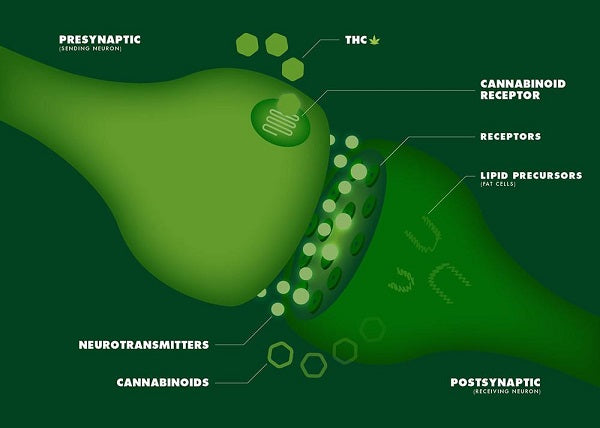Skin is our largest, and most exposed organ, protecting our bodies from the outer environment. Those who suffer from this condition know its hot pain, and the accompanying embarrassment its appearance often causes. Yet, cannabidiol (CBD) oil for eczema is an all-natural option that more and more people are turning to for effective, long-term relief.
Let's look at why, with CBD, eczema could perhaps meet its nemesis...!

First—Your Body Was Designed To Receive CBD
That’s why it works as well as it does, and as quickly as it does.
That’s also why people have used CBD oil for one thing, like anxiety or insomnia, and then found a big and surprising bonus when their eczema cleared, too. What's more—it appears to only cause side-effects in very high doses, if ingested. Even then, the symptoms disappear by themselves after a short while. [1]
This is all made possible by a very special system in the bodies of all vertebrates, called the endocannabinoid system (ECS). Let's trace back its history a bit.
In the 1960s, a chemist called Raphael Mechoulam (Ph.D) isolated two cannabinoids from cannabis—CBD, and later also tetrahydrocannabinol (THC). This was groundbreaking science at the time. Watch Mechoulam recount the history of his discovery. [2]
Then, at Mechoulam's laboratory in the 1990s, Czech analytical chemist L.O. Hanuš, and American molecular pharmacologist W.A. Devane, isolated a cannabinoid with a difference—anandamide (based on the Sanskrit word "ananda", which means "supreme joy").
Why was it different? Well, first of all, anandamide is not derived from cannabis. The researchers discovered that this compound is synthesized in specific areas in the brain, yet it binds to the same receptor site (imagine a catcher’s mitt) as the phytocannabinoids!
Later it was revealed that our cells have a whole system of these receptors in their membranes, specifically for the purpose of "catching" cannabinoids! In fact, we have more receptors for cannabinoids than we do for any other chemical compound.
The two main receptors isolated are called CB1 and CB2. The former is mainly found throughout the brain and central nervous system. And CB2 are found mainly in our immune and peripheral nervous systems. “CB” stands for cannabinoid. [3][4]
So far, more than 100 cannabinoids have been identified, of which THC and CBD are the most well-researched.
Plenty of CB receptors are situated in the skin, with apparently a myriad of functions. Say the reviewers in an article published in a 2009 Trends in Pharmacological Sciences issue:
"It seems that the main physiological function of the cutaneous ECS is to constitutively control the proper and well-balanced proliferation, differentiation and survival, as well as immune competence and/or tolerance, of skin cells."[5]
Therefore, it's not outrageous to state that ECS health is everything in skin health. Which just could make CBD its BFF.

Eczema Subsides When the Body Is in Homeostasis
CBD is masterful at bringing the body into balance. Unlike many medicines in the pharmaceutical industry, that work mainly to ameliorate symptoms, CBD works correctively with the ESC. This unique system seems to modulate all other systems in the body.
Whether it is administered topically or ingested, CBD creates a cascade of balancing actions inside our bodies.
So far, not much study specifically into the use of CBD oil for eczema has been done, but a review looking at The Risks and Benefits of Cannabis in the Dermatology Clinic, 2007, stated the following:
"There are several approved medical indications for cannabis use, including psoriasis, lupus, nail-patella syndrome, and severe pain. In addition, very preliminary studies have suggested cannabis and its derivatives might have a use in acne, dermatitis, pruritus, wound healing, and skin cancer. Further well-controlled studies are required to explore these potential uses." [6]
If you have severe eczema, it may be advisable to start taking CBD oil internally rather than applying it topically. The reason for this is because cannabidiol rectifies imbalances from the inside out...and the secret may be in its ability to take care of inflammatory conditions.
RELATED: 3 Ways CBD Oil Could Help Psoriasis
Inflammation Is the Mother of Pain and Disease
Even though inflammation starts as a healing response, it eventually disrupts homeostasis, which is exactly the overall state the body requires for health.
Simply ignoring internal imbalances that cause the inflammation (that, in turn, express as eczema), is of no long-term value. This is where CBD has long-term value, though. Cannabidiol binds to the affected receptor sites, travels to the nucleus of those cells, and restores real balance.
CBD up-regulates anti-inflammatory bio-chemicals and down-regulates inflammatory biochemicals.
Furthermore, have medical studies shown that our endocannabinoid system directly helps the function and fitness not only of each of our internal systems but also our skin cells:
“It seems that the main physiological function of the cutaneous ECS is to constitutively control the proper and well-balanced proliferation, differentiation and survival, as well as immune competence and/or tolerance, of skin cells.” [7]
It’s astounding how it partners with each of our body’s physiological systems, and brings out their balanced best.
And amazingly, people have reported success using CBD oil for eczema, whether they apply it as a topical balm, or ingest it sublingually.
RELATED: Could CBD Be Inflammation’s Worst Enemy ... Naturally?
Ready to Put Out That Fire Beneath Your Skin?
In addition to physical discomfort, sufferers of eczema also endure:
- sick leave and job-avoidance;
- social isolation and co-morbidities like anxiety and depression;
- dietary and sexual restrictions.
These painful limitations are unnecessary. With a good-quality CBD product, your skin can soon regain its luster.
Let's get to the low-down on what eczema is.
What Is Eczema?
Skin ranges from oily to dry, and different pigment offers different colors. In all that variety, over 30 million people in the U.S. suffer from some form of eczema.
‘Eczema’ comes from the Greek word ’ekzein,’ which means ‘to boil over.’ Any person with this affliction will attest that this is an accurate description of the symptoms.
The National Eczema Association defines eczema as “a group of medical conditions that cause red, inflamed and itchy skin”. The disease often appears as:
- Dry, sensitive skin
- Red, inflamed skin
- Very bad itching
- Dark colored patches of skin
- Rough, leathery or scaly patches of skin
- Oozing or crusting
- Areas of swelling [8]

RELATED: SOL*CBD Balm - What’s In It and What Are Its Benefits
It’s cause and cure are both, as yet, unknown. Not surprisingly, the pharmaceutical industry’s approach to the treatment of eczema is to suppress and mask its symptoms. Traditional strategies like steroid cream, are very often followed with unwanted side effects, such as TSW (topical steroid withdrawal) and, of course, horrid flare-ups the moment the steroids are discontinued.
Yet, CBD oil for eczema has been shown to have great results, and it is safe to use.
--------------
Sources:
- https://www.cbsnews.com/news/cbd-oil-cannabidiol-rise-in-popularity/
- https://www.youtube.com/watch?v=n3fkiwTABag
- https://emedicine.medscape.com/article/1361971-overview
- http://www.chm.bris.ac.uk/motm/anandamide/ananh.htm
- https://www.ncbi.nlm.nih.gov/pmc/articles/PMC2757311/
- https://journals.sagepub.com/doi/abs/10.1177/1203475417738971
- https://www.sciencedirect.com/science/article/pii/S0165614709001072
- https://nationaleczema.org/eczema/





























